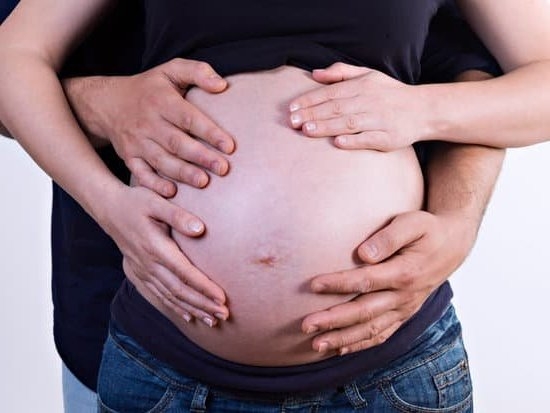Is it normal to lose weight during pregnancy? This question often sparks concern and confusion among expectant mothers. While weight gain is typically expected during pregnancy, some women may experience the opposite phenomenon of weight loss. In this article, we will delve into the topic of weight loss during pregnancy and provide insights into its causes, implications, and management.
Pregnancy is a time of significant physical changes for women, including fluctuations in weight. While weight gain is usually seen as a natural part of carrying a child, some pregnant individuals may find themselves losing weight instead. This can be alarming for many women who are accustomed to the idea of gaining weight during pregnancy as their bodies nurture a growing fetus.
There are various factors that can contribute to weight loss during pregnancy, ranging from underlying medical conditions to lifestyle habits. Understanding these factors can help expectant mothers navigate this unexpected aspect of pregnancy with more clarity and confidence. By shedding light on the reasons behind weight loss in pregnancy, we aim to empower pregnant women to prioritize their health and wellness throughout this transformative journey.
Understanding the Average Weight Gain During Pregnancy
During pregnancy, it is essential for expectant mothers to understand the average weight gain that is expected to occur. The amount of weight gained during pregnancy can vary from woman to woman, but on average, a healthy weight gain is about 25-35 pounds for women with a normal BMI. This weight gain is crucial for the overall health and development of the baby, as well as to support the changes happening in the mother’s body.
To help visualize the breakdown of this weight gain throughout pregnancy, here is a general guideline:
- 1st trimester: About 1-4 pounds gained
- 2nd trimester: About 1 pound per week
- 3rd trimester: About 1 pound per week
Factors such as genetics, pre-pregnancy weight, and overall health can influence how much weight an expectant mother should aim to gain. However, it is important to note that every pregnancy is different, and some women may not follow this exact pattern. It’s crucial for pregnant women to focus on their overall health rather than just focusing on the number on the scale.
Additionally, it is not uncommon for some women to experience weight loss during pregnancy due to various reasons. Understanding why this might happen and when it becomes a cause for concern can help expecting mothers navigate this aspect of their pregnancy journey with confidence and knowledge.
Factors That Can Lead to Weight Loss in Pregnancy
During pregnancy, it is typically expected for women to gain weight as their bodies support the growth and development of their baby. However, some women may experience unexpected weight loss during this crucial time. There can be a variety of factors that contribute to weight loss during pregnancy. One common reason is severe morning sickness, also known as hyperemesis gravidarum.
Hyperemesis gravidarum is a condition characterized by extreme nausea and vomiting during pregnancy, which can lead to dehydration and subsequent weight loss. This condition affects about 1-3% of pregnant women and can be quite challenging to manage. In some cases, it may require hospitalization for intravenous fluids and close monitoring. Pregnant women experiencing severe morning sickness should seek medical attention promptly.
Apart from morning sickness, other factors that can contribute to weight loss during pregnancy include underlying medical conditions such as thyroid disorders or gestational diabetes, intense stress or anxiety, lack of proper nutrition, or even certain medications that are not suitable for use during pregnancy. It is essential for expectant mothers to consult with their healthcare provider if they are experiencing unexplained weight loss during pregnancy to rule out any potential concerns.
| Common Factors | Frequency |
|---|---|
| Morning Sickness (Hyperemesis Gravidarum) | 1-3% of pregnant women |
| Underlying Medical Conditions | Varies |
| Stress/Anxiety | Varies |
Impact of Morning Sickness on Weight Loss
Morning sickness is a common occurrence during pregnancy, affecting up to 70% of expectant mothers. It typically begins in the first trimester and can lead to nausea, vomiting, and aversion to certain foods. For some women, morning sickness can result in weight loss due to the inability to keep food down or a decreased appetite. Despite the discomfort it brings, it is important to remember that some weight loss during pregnancy may be considered normal, especially during the first trimester.
There are several factors that contribute to weight loss during pregnancy, with morning sickness being one of the primary reasons. The constant nausea and vomiting can make it challenging for pregnant women to consume an adequate amount of calories and nutrients needed for both mother and baby’s health.
This can lead to unintentional weight loss, which may cause concern for some women. However, staying hydrated and finding small, frequent meals or snacks that are easier on the stomach can help manage these symptoms.
To combat weight loss associated with morning sickness, pregnant women should focus on consuming nutrient-dense foods that are easier to tolerate. Opting for bland, high-protein snacks like crackers, yogurt, or smoothies can help provide essential nutrients while being gentle on a sensitive stomach.
Additionally, avoiding trigger foods or smells that worsen nausea and consulting with a healthcare provider about safe medications or remedies is crucial in managing morning sickness-related weight loss. Remember that each woman’s experience with morning sickness is unique; what works for one may not work for another.
Healthy Eating Tips for Pregnant Women Experiencing Weight Loss
Weight loss during pregnancy can be a cause for concern for many expectant mothers. While some amount of weight loss is normal in the first trimester due to factors like morning sickness and food aversions, extreme or sudden weight loss may not be typical and should be addressed with your healthcare provider. It is important to remember that every woman’s body is different, and how they experience weight changes during pregnancy can vary.
One factor that can contribute to weight loss during pregnancy is severe morning sickness, also known as hyperemesis gravidarum. This condition can lead to frequent vomiting and dehydration, making it difficult for women to keep food down and maintain their weight. In cases like these, it is crucial for expectant mothers to work closely with their healthcare team to ensure both the health of the mother and the baby are not compromised.
For pregnant women experiencing weight loss, focusing on nutrient-dense foods that are easier to tolerate may help in maintaining a healthy diet. Opting for smaller, more frequent meals throughout the day, staying hydrated, and choosing foods high in protein and healthy fats can aid in proper nourishment even if appetite is reduced. Consulting with a registered dietitian or nutritionist who specializes in prenatal nutrition may also provide personalized guidance on meal planning during this time.
| Factors Contributing to Weight Loss During Pregnancy | Impact on Expectant Mothers |
|---|---|
| Morning Sickness | Potential dehydration and difficulty in keeping food down |
| Hyperemesis Gravidarum | Frequent vomiting leading to extreme weight loss |
When to Seek Medical Advice for Weight Loss During Pregnancy
Signs to Watch Out For
When it comes to weight loss during pregnancy, it is important to be mindful of any signs that may indicate a more serious issue. If you are experiencing sudden and drastic weight loss, especially in the second or third trimester, it is crucial to seek medical advice immediately. Additionally, if you notice any other concerning symptoms such as severe dehydration, dizziness, fainting, or persistent vomiting, do not hesitate to contact your healthcare provider.
Risk Factors for Complications
Certain risk factors can increase the likelihood of experiencing excessive weight loss during pregnancy. These may include underlying medical conditions like hyperemesis gravidarum, thyroid disorders, gestational diabetes, or eating disorders. It is important for pregnant women with these risk factors to be extra vigilant about their weight and overall health during pregnancy.
Consulting Your Healthcare Provider
If you are unsure whether your weight loss during pregnancy is within a normal range or if you have any concerns about your health and the well-being of your baby, do not hesitate to reach out to your obstetrician or midwife. They can provide guidance on monitoring your weight, ensuring proper nutrition intake, and determining if any additional tests or interventions are necessary.
Remember that seeking timely medical advice is essential in ensuring a healthy pregnancy for both you and your baby.
Real-Life Stories
Losing Weight During Pregnancy: Real-Life Experiences
Many women may experience weight loss during their pregnancy due to various reasons. One such reason could be hyperemesis gravidarum, a severe form of nausea and vomiting that can lead to significant weight loss. This condition can make it challenging for pregnant women to keep food down and maintain their weight. It is important for women who are experiencing extreme weight loss due to hyperemesis gravidarum to seek medical attention promptly.
Understanding the Emotional Impact of Weight Loss During Pregnancy
Experiencing weight loss during pregnancy can not only take a physical toll on women but also have emotional repercussions. It is normal for expectant mothers to feel anxious or worried about the health of their baby when they are losing weight instead of gaining it. Seeking support from healthcare providers, counselors, or support groups can help women cope with these emotions and stay mentally resilient during this challenging time.
Celebrating Resilience: Women Who Successfully Managed Weight Loss During Pregnancy
Despite the difficulties associated with losing weight during pregnancy, many women have successfully managed to navigate this journey while prioritizing their health and well-being. By following healthy eating habits, seeking medical advice when needed, and staying positive throughout their pregnancy, these women have shown that it is possible to overcome obstacles and have a healthy baby even with weight loss. Their stories serve as inspiration for other expectant mothers facing similar challenges in their pregnancy journey.
Conclusion
In conclusion, while weight gain is often associated with pregnancy, it is important to remember that every woman’s body reacts differently to the changes occurring during this transformative time. For some women, experiencing weight loss during pregnancy may raise concerns about their health and the well-being of their baby. However, it is essential to understand that in certain cases, mild weight loss can be considered normal and not necessarily harmful.
Throughout this article, we have discussed various factors that can contribute to weight loss during pregnancy, such as morning sickness, increased metabolism, or underlying medical conditions. It is crucial for expectant mothers to listen to their bodies and prioritize healthy eating habits even when facing challenges in maintaining or gaining weight. By consuming nutrient-dense foods and staying hydrated, pregnant women can support their own health as well as the development of their growing baby.
Ultimately, if an expectant mother continues to experience significant or persistent weight loss during pregnancy despite efforts to maintain a balanced diet and lifestyle, it is important to seek medical advice promptly. Consulting with healthcare professionals will help ensure that any underlying issues are addressed promptly and appropriate measures are taken to safeguard both the mother’s and the baby’s health.
Remember, each pregnancy journey is unique, so it is vital for pregnant women to advocate for themselves by seeking guidance and support when needed.
Frequently Asked Questions
Why Am I Losing Weight While Pregnant?
Losing weight while pregnant can be due to various reasons such as morning sickness, poor appetite, or underlying health conditions like hyperemesis gravidarum. It’s important to consult with a healthcare provider to ensure the well-being of both the mother and baby.
Is It Normal to Lose 10 Pounds in First Trimester?
Experiencing a weight loss of 10 pounds in the first trimester of pregnancy can be normal for some women, especially if they have severe morning sickness or food aversions. However, it’s crucial to monitor this weight loss closely and consult with a healthcare provider to ensure it does not pose any risks to the pregnancy.
What Causes Rapid Weight Loss After Pregnancy?
Rapid weight loss after pregnancy can be attributed to factors like breastfeeding, increased physical activity, hormonal changes, and decreased calorie intake. It’s essential for new mothers to focus on gradual weight loss through a balanced diet and regular exercise to promote overall well-being.

Welcome to my fertility blog. This is a space where I will be sharing my experiences as I navigate through the world of fertility treatments, as well as provide information and resources about fertility and pregnancy.





